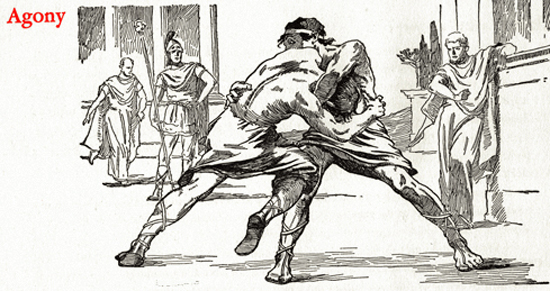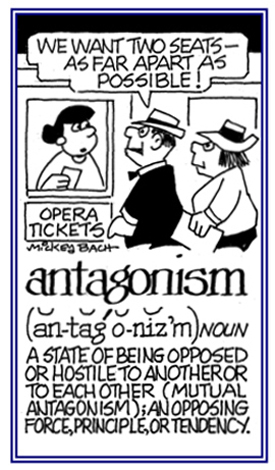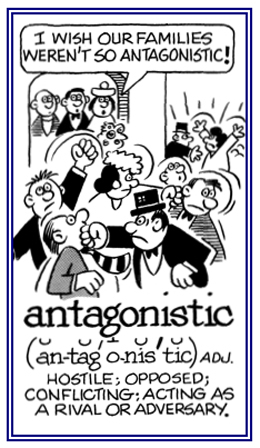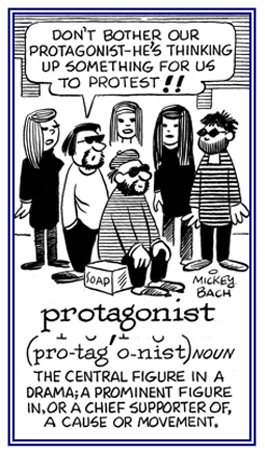agon-
(Greek: struggle, a contest, to contend for a prize; also, to lead, set in motion, drive, conduct, guide, govern; to do, to act; by extension, pain)
2. Death pangs: Lorna said her husband died in agony at the hospital.
3. A convulsive struggle: The doctor told Harriet that the medicine would relieve her of the agony of the muscle cramps.
4. A sudden, strong outburst of emotion: There was an agony of joy when the school's football team won the championship.
Word History

It is strange that a word which currently refers to anguish and intolerable pain should have its origin in a festive sport event, yet that is the case with agony. In ancient Greece, agon was a public assembly, especially one for public games and athletic contests.
Agonia was the contest or struggle for a prize. From the meaning "a struggle for victory in the games", agonia gradually expanded to mean any physical struggle, an activity fraught with difficulty or pain, and then mental anguish as well.
Our own English word agony, borrowed from this source, meant struggle or anguish of mind, then the throes (violent pangs of suffering) of death, and then any extreme suffering of body or mind.
2. Concerning the main force or character that opposes the protagonist in a story: Jack read a drama about an antagonal man who was threatening the main character in the story, which finally ended with the enemy being shot.
2. In physiology, the interaction between two or more chemical substances in the body that diminishes the effect each of them has individually: Antagonism can be seen in lab rats when the chemical dopamine slows down their movements, as it impedes the usual functions of their physical activities.

Go to this Word A Day Revisited Index
so you can see more of Mickey Bach's cartoons.
2. The principal character in opposition to the protagonist of a narrative or drama: James thought that crime novels were most exciting when there was not only a wonderful and good protagonist, but also an antagonist who was the criminal.
3. Something opposing or resisting the action of another: Antagonists can be certain structures, agents, diseases, or physiologic processes that tend to neutralize or impede the action or effect of others.
4. In biochemistry, a chemical substance that interferes with the physiological action of another: Antagonists can bind to a receptor, but is not able to produce a physiological response especially because of combining with and blocking its nerve receptor.
2. In physiology, a reference to muscles that counteract each other's action: Two muscles or groups of muscles which are antagonistic to each other result in either no movements or movements in a line of actions of the stronger muscles.

Go to this Word A Day Revisited Index
so you can see more of Mickey Bach's cartoons.
2. Descriptive of something which occurs or exists immediately before the agony of death: The family gathered around the dying patriarch's bed in the preagonal hours in advance of his demise.
Death "agony" is an old term for the period just before someone dies which was thought to be a time of extreme suffering.
2. A leading personage in any contest; a prominent supporter or champion of any cause: The protagonist is not necessarily a "good person".
In ancient Greek drama, the protagonist was said to be the main character, however in a modern work with more than one main character, there might be more than one protagonist.
4. Etymology: borrowed from Greek, proto-, "first in time, earliest" + agonistes, "actor, combatant".


